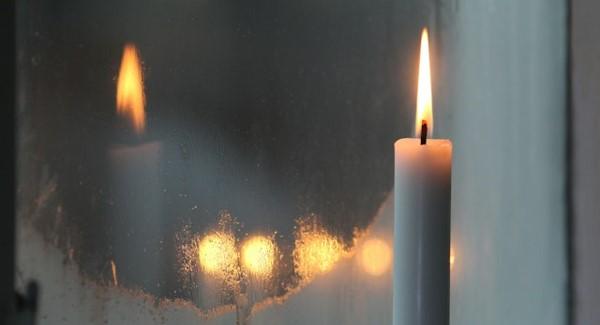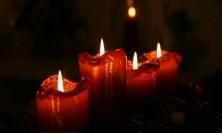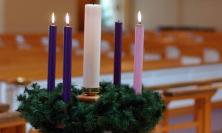In a tumultuous world, the stillness to which Advent invites us might be welcome, unfamiliar or unnerving – or perhaps a mixture of all three. But if we embrace it, we will be rewarded with glimpses of both the mystery and clarity which the season offers, says Teresa White FCJ.
Every year we celebrate the holy season of Advent, O God. Every year we pray those beautiful prayers of longing and waiting, and sing those lovely songs of hope and promise.[i]
Seigneur, venez (‘Come, Lord’) is one of those lovely songs. I first heard it when I was a student in France many years ago, and during the days of Advent, I often find myself humming it, singing it under my breath, words and melody carrying me into the unique atmosphere and spirit of this midwinter season of hope and promise. The song is not relentlessly otherworldly and positive, highlighting comfort, peace and joy. Instead, it seeks to acknowledge the brokenness of life, to open us to the mystery of God’s presence in human experience, even when it is bitterly cold and the night seems endless (‘le froid nous mord et la nuit est sans fin’). Seigneur, venez ends with a prayer that God’s Spirit will enable a dying world to be re-born (‘qu’au feu de l’Esprit renaisse un monde qui meurt’). Given all that is happening today, some would readily identify with that idea of a ‘dying world’, wondering perhaps if the final line, ‘My God, may your kingdom come!’ (‘Mon Dieu, que votre règne arrive!’) is not simply a wish but an urgent question: will God’s kingdom ever come?
Indeed, in today’s world, what do we Christians really mean when we say in the eucharistic prayer that we are waiting ‘in joyful hope for the coming of our Saviour, Jesus Christ’? We hear daily reports of unbridled warfare, of deeply troubled communities, of the woes of ‘our suffering planet’[ii], caused by ‘unchecked human intervention in nature’[iii]. Will Isaiah’s prophecy, ‘nation will not lift sword against nation, there will be no more training for war’, (2:4) ever come to pass? When will the desert ‘sing and rejoice … and the wilderness blossom with flowers’ (35:1-2)? As we wrestle with such questions, it seems that the human longing for justice, for peace, for healing, has never been so heartfelt.
Advent does not answer those questions. Advent is a journey we make not in order to arrive, but just to walk. It calls us to stillness and prayer, invites us to seek and experience the sense of the mystery that lies at the heart of our lives and of which, in the rough and tumble of the rest of the year, we can lose sight. That is why I have often thought that, of all the liturgical seasons, Advent is the most poetic; its mood is calm and meditative, and it opens us to the infinite scope of life and mortality. It is poetry – which Shelley called ‘a mirror which makes beautiful what is distorted’ – that enables this to happen. Poetry is the language of the soul. It somehow reflects the beauty and ugliness of life, its moments of deep peace and disturbing violence, its amazing tenderness and bewildering cruelty. In Advent, we pray that God’s presence may once again refresh and renew the life of the world as it unfolds in repose and struggle, in laughter and weeping, in poetry and prose.
In the northern hemisphere, the natural world in December is at its least inviting: gardens and meadows flowerless, trees leafless, fields bare, daylight hours at their shortest, weather often cold and bleak. Given the rapid advance of global warming, this may not be true for much longer, but for the moment, we still think of winter as the season when the earth is at rest, when signs of growth are not yet visible. Yet for Christians, with Christmas on the near horizon, the last month of the year is not a depressing time, as children well know. Advent reminds us that that God’s love and compassion embrace the whole of creation, that Christ takes ‘in His gospel net / the hue and cry of existence.’[iv]
Today, in our hyper-active culture, there is little esteem for waiting, of its nature inactive, non-productive. Silence is even less popular – I read recently that in most social situations, a very brief silence is just about acceptable; then, after five seconds, most people start to experience anxiety, and after seven, almost always someone feels impelled to speak. Advent, however, draws us into stillness, and this can be a shock to the system. John Main puts it this way:
It’s as though we were rushing through our lives, and in our hearts, there is the flame of a candle. Because we are moving at such high speed, this essential interior flame is always on the point of going out. But when we sit down to meditate, when we become still, when we are not thinking in terms of our success or self-importance, of our own will, when we are just in the presence of the One who is, then the flame begins to burn brightly. We begin to understand ourselves and others in terms of light, warmth and love.[v]
Of course, it is not just physical warmth and light that we long for. Whoever we are, wherever we happen to live, we all have our personal moments of suffering and distress, as well as fears and anxieties for those we love, for our country, while the problems of the wider world are thrust into our consciousness by the global media. Advent invites us to enter into that quiet space where we can become aware of the universal human longing for healing, for peace, for love. The four candles on the Advent wreath, re-lit in our homes and churches as year follows year, beckon us to look at our lives with a vision cleansed of triviality. In this time of waiting and silence, new perspectives open up for us, and we realise that ‘the Lord is very near’. Advent is where the change of optic begins; Christmas is where God’s love is made visible. It is then that the Good News becomes a reality: ‘Comfort is here; help has come down from heaven.’ (Bernard of Clairvaux)
Sister Teresa White belongs to the Faithful Companions of Jesus. A former teacher, she spent many years in the ministry of spirituality at Katherine House, a retreat and conference centre run by her congregation in Salford.
[i] Karl Rahner SJ, Encounters With Silence (Newman Press, 1965).
[ii] Pope Francis, Laudate Deum (2023), §2.
[iii] Laudate Deum, §14.
[iv] Daniel Berrigan SJ, ‘The Face of Christ’, in And the Risen Bread: Selected and New Poems, 1957-1997 (Fordham University Press, 1998).
[v] John Main OSB, ‘Value of Spiritual Practice’, Transformed in Christ, Mediatio Series 2017A (World Community for Christian Meditation, 2016), 17.






